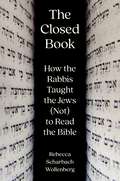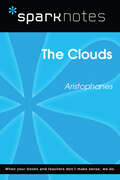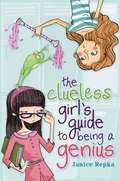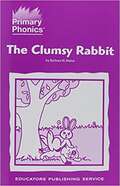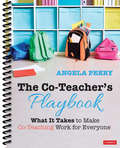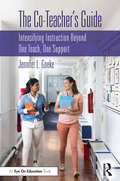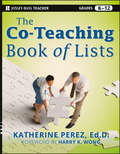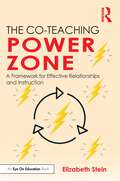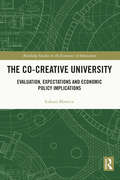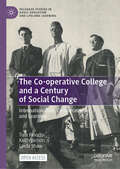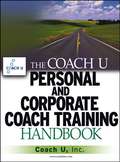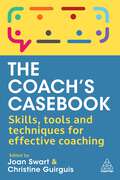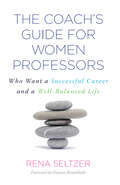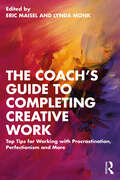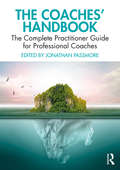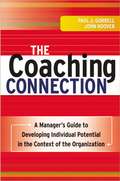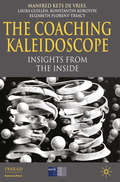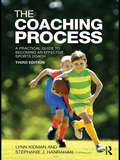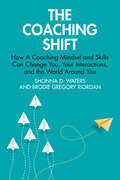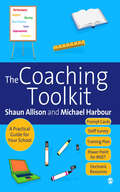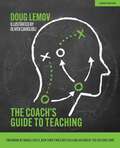- Table View
- List View
The Clockwork Muse
by Eviatar ZerubavelFor anyone who has blanched at the uphill prospect of finishing a long piece of writing, this book holds out something more practical than hope: it offers a plan. The Clockwork Muse is designed to help prospective authors develop a workable timetable for completing long and often formidable projects. The idea of dashing off a manuscript in a fit of manic inspiration may be romantic, but it is not particularly practical. Instead, Eviatar Zerubavel, a prolific and successful author, describes how to set up a writing schedule and regular work habits that will take most of the anxiety and procrastination out of long-term writing, and even make it enjoyable. The dreaded "writer's block" often turns out to be simply a need for a better grasp of the temporal organization of work. The Clockwork Muse rethinks the writing process in terms of time and organization. It offers writers a simple yet comprehensive framework that considers such variables as when to write, for how long, and how often, while keeping a sense of momentum throughout the entire project. It shows how to set priorities, balance ideals against constraints, and find the ideal time to write. For all those whose writing has languished, waiting for the "right moment," The Clockwork Muse announces that the moment has arrived.
The Closed Book: How the Rabbis Taught the Jews (Not) to Read the Bible
by Rebecca Scharbach WollenbergA groundbreaking reinterpretation of early Judaism, during the millennium before the study of the Bible took center stageEarly Judaism is often described as the religion of the book par excellence—a movement built around the study of the Bible and steeped in a culture of sacred bookishness that evolved from an unrelenting focus on a canonical text. But in The Closed Book, Rebecca Scharbach Wollenberg argues that Jews didn&’t truly embrace the biblical text until nearly a thousand years after the Bible was first canonized. She tells the story of the intervening centuries during which even rabbis seldom opened a Bible and many rabbinic authorities remained deeply ambivalent about the biblical text as a source of sacred knowledge.Wollenberg shows that, in place of the biblical text, early Jewish thinkers embraced a form of biblical revelation that has now largely disappeared from practice. Somewhere between the fixed transcripts of the biblical Written Torah and the fluid traditions of the rabbinic Oral Torah, a third category of revelation was imagined by these rabbinic thinkers. In this &“third Torah,&” memorized spoken formulas of the biblical tradition came to be envisioned as a distinct version of the biblical revelation. And it was believed that this living tradition of recitation passed down by human mouths, unbound by the limitations of written text, provided a fuller and more authentic witness to the scriptural revelation at Sinai. In this way, early rabbinic authorities were able to leverage the idea of biblical revelation while quarantining the biblical text itself from communal life.The result is a revealing reinterpretation of &“the people of the book&” before they became people of the book.
The Clouds (SparkNotes Literature Guide Series)
by SparkNotesThe Clouds (SparkNotes Literature Guide) by Aristophanes Making the reading experience fun! Created by Harvard students for students everywhere, SparkNotes is a new breed of study guide: smarter, better, faster.Geared to what today's students need to know, SparkNotes provides:chapter-by-chapter analysis explanations of key themes, motifs, and symbols a review quiz and essay topics Lively and accessible, these guides are perfect for late-night studying and writing papers.
The Clueless Girl's Guide to Being a Genius
by Janice RepkaAphrodite Wigglesmith is a thirteen-year-old prodigy. After a fast track through Harvard, she's back at her old middle school to teach remedial math and prove a bold theory: anyone can be a genius with the right instruction. Enter Mindy, a ditzy baton twirler who knows more about hair roots than square roots. What could she possibly learn from such a frumpy nerd, except maybe what not to wear? But somewhere between studying and shopping, the two girls start to become friends. They're an unlikely pair, but in this uproarious middle-grade comedy, wacky is the norm and anything is possible - just like middle school. .
The Clumsy Rabbit (Primary Phonics #Set 5 Book 10)
by Barbara W. MakarA systematic, phonics-based early reading program that includes: the most practice for every skill, decodable readers for every skill, and reinforcement materials--help struggling students succeed in the regular classroom
The Co-Teacher's Playbook: What It Takes to Make Co-Teaching Work for Everyone (Corwin Teaching Essentials)
by Angela PeeryExpert guidance for creating a successful partnership! Whether you’re new to co-teaching, new to your partner, or just see room for improvement in the way you connect, you probably face challenges with communication, planning, grading, and more. When co-teaching is done well, though, the benefits for students are immeasurable. So grab a cup of coffee and your co-teacher—this hands-on book is designed for you to work through together. Features include: • Stories from experienced co-teachers • Reflective activities to help each of you discover your collaboration style • Reproducible lists, checklists, templates, agreements, and more to complete together • A downloadable unit-planning tool
The Co-Teacher's Playbook: What It Takes to Make Co-Teaching Work for Everyone (Corwin Teaching Essentials)
by Angela PeeryExpert guidance for creating a successful partnership! Whether you’re new to co-teaching, new to your partner, or just see room for improvement in the way you connect, you probably face challenges with communication, planning, grading, and more. When co-teaching is done well, though, the benefits for students are immeasurable. So grab a cup of coffee and your co-teacher—this hands-on book is designed for you to work through together. Features include: • Stories from experienced co-teachers • Reflective activities to help each of you discover your collaboration style • Reproducible lists, checklists, templates, agreements, and more to complete together • A downloadable unit-planning tool
The Co-Teacher’s Guide: Intensifying Instruction Beyond One Teach, One Support
by Jennifer L. GoekeThis pragmatic guide provides concrete, detailed strategies for co-teachers looking to expand their instructional methods and involvement beyond the One Teach, One Support model. Including step-by-step examples, practical scenarios, and visuals of successful implementations to help you quickly and effectively put these tools into practice, each chapter also highlights specific tensions that can arise in your co-teaching partnership and frames effective solutions to move beyond them efficiently and effectively. While designed for both teachers in a co-teaching pair, the book’s tools can easily be applied on your own, making this an ideal resource for co-teachers with limited common planning time.
The Co-Teaching Book of Lists
by Harry K. Wong Katherine D. PerezPractical strategies for teachers who share classroom teaching responsibilitiesFilled with down-to-earth ideas, suggestions, strategies, and techniques, The Co-Teaching Book of Lists provides educators with a hands-on resource for making the co-teaching experience a success. Written by educator and popular teacher trainer Kathy Perez, this book gives educators a classroom-tested and user-friendly reference for the co-taught classroom. Topics covered include: roles and responsibilities; setting up the classroom; establishing classroom climate; effective accommodations and modifications for students; goal-setting; negotiating conflicts; scheduling issues; and more.Author Katherine Perez is a popular presenter and workshop leader for Bureau of Education and Research and Staff Development for Educators Offers best practices and helpful strategies for making co-teaching a successIncludes a wealth of ideas that are both practical and easy to implement This easily accessible reference presents numerous positive and ready-to-use tips, strategies, and resources for collaborative teaching and student success.
The Co-Teaching Power Zone: A Framework for Effective Relationships and Instruction
by Elizabeth SteinNavigating co-teacher power balances can be tricky. This refreshing book provides a new way to experience meaningful co-teaching collaborations by illuminating the value of working independently and then reconnecting in order to strengthen relationships and outcomes. Author Elizabeth Stein introduces the Co-Teaching Power Zone Framework, which includes a process of valuable disconnected co-teaching opportunities as well as the use of cogenerative dialogues, to help you cultivate a relationship that flows into the classroom environment and into daily instructional decisions. Each chapter includes example scenarios and reflection questions to help you apply the ideas to your own setting. With this book’s realistic and helpful framework, you’ll be able to transform your co-teaching practices while co-creating a culture of belonging with one another and with every learner in the room.
The Co-creative University: Evaluation, Expectations and Economic Policy Implications (Routledge Studies in the Economics of Innovation)
by Łukasz MamicaThe co-creative university has become the main driver of social and economic development stimulating internal (students and academics) and external creativity (companies and institutional environment) as well as cooperation in various areas (e.g. applied graduation theses, research projects, lifelong learning). Intended as a contribution to a better understanding of how universities create value in numerous areas, this book discusses the determinants of creativity and ways of stimulating it with a special focus on approaches and practical solutions relevant to teaching. Examples include problem-oriented student theses, which represent a successful combination of creativity with practical knowledge. Based on the findings of international surveys of students, the author offers an in-depth analysis of the differences between what they expect from universities and the degree to which their expectations are met. Comparing students’ opinions with those of employees of international corporations (working graduates) permitted the author to test the actual utility of selected aspects of university education. Regrettably, both groups of respondents gave low ratings to support for developing creativity, which should serve as a warning sign and inform future reforms at this level of education. This book is primarily targeted to those involved in education, policy-making, and socio-economic development. It provides a rich source of information for university managers on how to better fulfil their missions based on the idea of co-creativity. It also suggests how to improve the effectiveness of research and education in order to ensure that both can better respond to current development challenges.
The Co-operative College and a Century of Social Change: Internationalism, Co-operativism and Learning (Palgrave Studies in Adult Education and Lifelong Learning)
by Linda Shaw Tom Woodin Keith VernonThis open access book explores the Co-operative College’s distinctive adult educational tradition over the past century as it provided education for co-operative leaders, employees and members in addition to developing a range of wider educational initiatives and ideas internationally. The Co-operative College is a British educational charity established in 1919, founded on co-operative principles. It played a crucial role in co-operative education in the British Empire and subsequently in the independent nations. In doing so, it brought together vocational and liberal education as well as educating members as part of a movement that fostered significant social change. It draws on original archival research at the National Co-operative Archive in Manchester as well as other material at the National Archives, Bishopsgate Institute and the British Library. Furthermore, the rich archives of the National Co-operative Archive allow for the development of a rich visual history of the movement to be explored.
The Coach U Personal and Corporate Coach Training Handbook
by Coachinc. Com StaffThe Most Comprehensive TrainingTool for New and Experienced Coaches Founded in 1988, Coach U, Inc. , is the largest provider of online training for individuals interested in entering the fields of personal and professional coaching. Coach U, Inc. , has educated more than ten thousand people, providing them the information, tools, and knowledge they need to successfully enter the fast-growing world of life, career, business, and corporate coaching. Now, for the first time, Coach U, Inc. , is making its complete course materials available in book form. These provide the basic foundations and training necessary to allow you to take control of your own career; enjoy personal, professional, and financial success; and experience the fulfillment that goes with providing a meaningful service to others. Coach U, Inc. 's unique approach to training encompasses the entire development of the professional coach. From the beginnings of becoming a coach, to all the ins-and-outs of growing a successful coaching practice, this program provides a comprehensive, step-by-step approach to learning how to become a strong, ethical, and dynamic leader in the coaching field. The Coach U Personal and Corporate Coach Training Handbook is the only comprehensive handbook currently available that provides step-by-step training for individuals seeking preparation and certification as a personal or corporate coach. Using the proven Coach U method, this book draws on a multidisciplinary approach to present a complete guide to the business and practice of personal and corporate coaching. This helpful text features: * Detailed coverage of the core skills and methodologies employed in personal and corporate coaching, including a chapter on ethics * Includes coaching scenarios and case studies that demonstrate skills in action * Chapters on marketing and selling your coaching practice and services as well as guidance on practice management As personal and professional coaching continues to prove its benefits to businesses and individuals, Coach U, Inc. , through its Coach U and Corporate Coach U divisions, remains the recognized leader for professional coach training and certification.
The Coach's Casebook: Skills, Tools and Techniques for Effective Coaching
by Joan Swart and Christine GuirguisWhat skills do I need to craft clear and effective coaching questions? How do I set goals for my clients? What do I need to be aware of when coaching with different personalities and facing mental health conditions? The Coach's Casebook answers these questions and provides coaches with a thorough grounding in the knowledge, competencies, tools and techniques they need to coach employees to reach their full potential. This book also explains how these coaching tools and techniques apply in practice to boost personal development, performance and wellbeing.There is extensive coverage of how to apply coaching interventions to manage work-life balance and prevent burnout at work and at home, and how to combine coaching and mindfulness as well as how to encourage clients to develop a growth mindset and reframe imposter syndrome. Specific guidance on active listening, coaching high-performers and those with high-potential, leadership coaching, coaching minorities and underrepresented groups and how to coach challenging personalities is also given. This practical guide, is supported by case studies and scenarios throughout taking from real-life coaching, is for those new to coaching and those in the intermediate stages of their career. The Coach's Casebook contains everything needed to allow clients to flourish.
The Coach's Guide for Women Professors: Who Want a Successful Career and a Well-Balanced Life
by Rena SeltzerIf you find yourself thinking or saying any of the following, this is a book you need to pick up.I know or suspect that I am underpaid, but I hate negotiating. I do everything else first and then write in the time left over.I’m not sure exactly what the promotion requirements are in my department.Since earning tenure, my service load has increased and my research is suffering. I don’t get enough time with my family.This is a practical guide for women in academe – whether adjuncts, professors or administrators – who often encounter barriers and hostility, especially women of color, and generally carry a heavier load of service, as well as household and care responsibilities, than their male colleagues. Rena Seltzer, a respected life coach and trainer who has worked with women professors and academic leaders for many years, offers succinct advice on how you can prioritize the multiplicity of demands on your life, negotiate better, create support networks, and move your career forward. Using telling but disguised vignettes of the experiences of women she has mentored, Rena Seltzer offers insights and strategies for managing the situations that all women face – such as challenges to their authority – while also paying attention to how they often play out differently for Latinas, Black and Asian women. She covers issues that arise from early career to senior administrator positions. This is a book you can read cover to cover or dip into as you encounter concerns about time management; your authority and influence; work/life balance; problems with teaching; leadership; negotiating better; finding time to write; developing your networks and social support; or navigating tenure and promotion and your career beyond.
The Coach's Guide to Completing Creative Work: Top Tips for Working with Procrastination, Perfectionism and More
by Eric Maisel Lynda MonkThis book brings together 38 creativity coaches from around the world to offer coaches, therapists, creatives and clients accessible and practical tools to get their creative work done. Curated by two leading creativity coaches, these chapters seek to help coaches and clients alike tackle common challenges that all creatives face when finishing a project. Chapters cover topics such as procrastination, failure, accountability, perfectionism, mindfulness, the importance of support, perseverance and more, with each section finishing with tips for both clients and coaches that can be used in sessions. Filled with rich case studies and true stories from creativity coaches throughout, this book addresses the current issues of our times, such as the distractions of social media, remote working and the effects of the COVID-19 pandemic. Applicable to a range of creative disciplines, this book is essential reading for coaches, therapists and their creative clients looking to complete their creative work efficiently and effectively.
The Coaches' Handbook: The Complete Practitioner Guide for Professional Coaches (Wiley-blackwell Handbooks In Organizational Psychology Ser.)
by Jonathan PassmoreThis comprehensive practitioner guide provides an accessible evidenced based approach aimed at those new to coaching and who may be undertaking coach training for a certificate in coaching or professional credentials or accreditation with the AC, ICF, EMCC, CMI or ILM. The book will also be useful for those who want to enhance their coaching skills. The Coaches Handbook is edited by Jonathan Passmore, an internationally respected expert and executive coach, with chapters from leading coaching practitioners from across the world. The book is divided into seven sections. Section one examines the nature of coaching, its boundaries, the business case for coaching and how organisations can build a coaching culture. Section two focuses on deepening our self-understanding and understanding our clients, the non-violent communications mindset and the coaching relationship. Section three focuses on the key skills needed for coaching including goal setting, powerful questions, active listening, using direct communications and the role of silence, emotions and challenge in coaching. Section four offers a range of coaching approaches including behavioural, person-centred, solution-focused, psychodynamic, neuroscience, narrative, positive psychology, out-door eco-coaching, team coaching, careers coaching and integrated coaching. Section five focuses on fundamental issues in coaching such as ethics and contracting and evaluation. Section six explores continuous professional development, reflection and the role of supervision, as well as how to establish your coaching business. The final section contains a host of coaching tools which practitioners can use to broaden their practice. Unique in its scope, this key text will be essential reading for coaches, academics and students of coaching. It is an important text for anyone seeking to understand the best practice approaches that can be applied to their coaching practice, including human resources, learning and development and management professionals, and executives in a coaching role.
The Coaching Connection: A Manager's Guide to Developing Individual Potential in the Context of the Organization
by John Hoover Paul GorrellTraditional coaching methods have focused entirely on the individual--sometimes even at the expense of improving measurable business results for the company. Now, authors John Hoover and Paul J. Gorrell, both notable leaders and talent experts, show managers how they can use contextual coaching to ensure both individuals and organizations experience the highest probability for success. Contextual coaching uses a dual-focus systems approach to align coaching processes with the strategies, cultural imperatives, talent management systems, communication practices, and competency requirements of an entire organization. The Coaching Connection teaches readers how to apply this methodology by taking all of these factors into consideration within their own organizational context. When coaching initiatives are successful, individual and organizational interests become one. Including a 360-degree assessment covering the ten most essential skill sets of well-balanced and effective leaders, as well as systems for measuring and managing talent, The Coaching Connection helps companies improve both their people--and their bottom line results.
The Coaching Kaleidoscope
by Elizabeth Florent-Treacy Manfred Kets De Vries Laura Guillen Konstantin KorotovThrough sharing the research methodologies, and describing intervention and change techniques used in leadership development, this book, written by IGLC-INSEAD professors and leadership coaches, contributes to a better understanding of how organizations may go beyond coaching in order to create best places to work.
The Coaching Process: A Practical Guide to Becoming an Effective Sports Coach
by Stephanie J. Hanrahan Lynn KidmanIn this fresh and engaging introduction to sports coaching, Lynn Kidman and Stephanie Hanrahan guide students through the coaching process. Focusing on the practical aspects of sports coaching, the book helps students to develop their basic technical skills as well as strategies for working with individual and team athletes, and to plan and implement effective coaching sessions. The book develops an "athlete-centred approach" to sports coaching, by which athletes take ownership of their learning, in turn strengthening their abilities to retain key skills and to make effective decisions during competition. Useful pedagogical features in each chapter, such as real life case studies, activities, self-reflection questions, and summaries of current research and best practice, encourage reflective practice and help student coaches to develop and extend their coaching techniques and philosophies. The Coaching Process is invaluable reading for any student starting a sports coaching course at college or university, and for any coach working with athletes or children in sport who wants to improve their practical skills.
The Coaching Shift: How A Coaching Mindset and Skills Can Change You, Your Interactions, and the World Around You
by Brodie Gregory Riordan Shonna D. WatersThe Coaching Shift: How A Coaching Mindset and Skills Can Change You, Your Interactions, and the World Around You offers practical guidance on how to adopt a coaching mindset and how to build a coaching skill set to unlock better communication, stronger relationships, and high performance in others. Accessible and practical, the book draws on research from coaching, neuroscience, cognitive psychology, social psychology, and industrial-organizational psychology to provide the best science-based practices that can be applied in work and life. It presents core coaching skills that anyone can develop and use to improve their own emotions, thoughts, behaviors, and interactions with others. It uses levels of analysis to help readers think about key concepts first in relation to themselves, and then in 1:1 interactions, group and team dynamics, organizational-level impact, and beyond. The book offers specific and tangible advice for readers to develop their coaching and communication skills, while also developing a deeper understanding of themselves. The Coaching Shift, with its clear tone, anecdotal references, and practical application, will be essential reading for coaches in practice and in training, and for academics and students of coaching and coaching psychology. These concepts and practices are also relevant for anyone who wants to have more effective interactions with others.
The Coaching Toolkit: A Practical Guide for Your School
by Michael Harbour Shaun AllisonDo you want to know how to establish a coaching programme in your school? Using lots of examples of successful coaching in practice to set you on the road to coaching success, this book guides you through the process of setting up and running an effective coaching programme in your school. The authors are both secondary specialists, but the principles they set out in this book are broadly applicable to all schools. There is clear advice on: - introducing coaching in your school; - choosing your coaches; - training your coaches; - measuring the positive impact of coaching on the school; - making coaching part of professional development for all staff; - a suggested timeline for implementing a coaching programme. Features of the book include chapter objectives, questions for reflection to use in training activities, a number of short case studies from secondary schools and further education colleges showing how coaching has worked in practice, suggestions for further reading and pointers to useful websites. There are useful photocopiable materials provided to use with most chapters, and there is a PowerPoint presentation available entitled Coaching for Performance that you can use to explain ideas to colleagues. This bank of resources that accompanies the book is available to download from the SAGE website, and you can adapt the materials for any setting. This book is an ideal resource for anyone looking to establish a coaching programme in their school, and offers you all the support, guidance and resource materials you will need.
The Coach’s Guide to Teaching
by Doug LemovThe mark of a great coach is a constant desire to learn and grow. A hunger to use whatever can make them better.The best-selling author of Teach Like a Champion and Reading Reconsidered brings his considerable knowledge about the science of classroom teaching to the sports coaching world to create championship caliber coaches on the court and field.What great classroom teachers do is relevant to coaches in profound ways. After all, coaches are at their core teachers.Lemov knows that coaches face many of the same challenges found in the classroom, so the science of learning applies equally to them. Unfortunately, coaches and organizations have a mixed level of understanding of the research and study of the science of learning. Sometimes coaches and organizations build their teaching on myths and platitudes more than science. Sometimes there isn’t any science applied at all.While there are thousands of books and websites a coach can consult to better understand technical and tactical aspects of the game, there is nothing for a coach to consult that explicitly examines the teaching problems on the field, the court, the rink, and the diamond. Until now.Intended to offer lessons and guidance that are applicable to coaches of any sporting endeavor including everyone from parent volunteers to professional coaches and private trainers, Lemov brings the powerful science of learning to the arena of sports coaching to create the next generation of championship caliber coaches.
The Coach’s Guide to Teaching
by Doug LemovThe mark of a great coach is a constant desire to learn and grow. A hunger to use whatever can make them better.The best-selling author of Teach Like a Champion and Reading Reconsidered brings his considerable knowledge about the science of classroom teaching to the sports coaching world to create championship caliber coaches on the court and field.What great classroom teachers do is relevant to coaches in profound ways. After all, coaches are at their core teachers.Lemov knows that coaches face many of the same challenges found in the classroom, so the science of learning applies equally to them. Unfortunately, coaches and organizations have a mixed level of understanding of the research and study of the science of learning. Sometimes coaches and organizations build their teaching on myths and platitudes more than science. Sometimes there isn’t any science applied at all.While there are thousands of books and websites a coach can consult to better understand technical and tactical aspects of the game, there is nothing for a coach to consult that explicitly examines the teaching problems on the field, the court, the rink, and the diamond. Until now.Intended to offer lessons and guidance that are applicable to coaches of any sporting endeavor including everyone from parent volunteers to professional coaches and private trainers, Lemov brings the powerful science of learning to the arena of sports coaching to create the next generation of championship caliber coaches.

